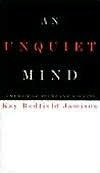More on this book
Community
Kindle Notes & Highlights
Manic-depressive illness forces one to deal with many aspects of growing old—with its physical and mental infirmities—many decades in advance of age itself.
how important a sense of life is to love, and love to life.
manic-depressive illness was hereditary. It also was not talked about. It was unpredictable, and not uncommonly fatal.
he had arranged dinner invitations from two senior British army officers, both of whom had manic-depressive illness.
“It is the history of our kindnesses that alone makes this world tolerable,” wrote Robert Louis Stevenson. “If it were not for that, for the effect of kind words, kind looks, kind letters … I should be inclined to think our life a practical jest in the worst possible spirit.”
was a diplomatic courier with a letter from David’s commanding officer saying that David, who had been on general medical duty in Kathmandu, had died very suddenly of a massive heart attack. He was forty-four, and I was thirty-two.
Its collection of early printed books is said to have been hampered by the fact that the college was convinced that the printing press was only a passing fad, one that would never be able to replace handwritten manuscripts.
the love I was privileged to know, and the recollection of the precarious balance that exists between sanity and a subtle, dreadful muffling of the senses.
In many ways, I was a stranger to the normal world.
from my husband, the man with whom I have lived for almost a decade.
Concerts and opera, mainstays of my existence, were torture to him, as were long, extended talks or vacations lasting more than three days.
He, in fact, couldn’t sit still very long, had a scarcely measurable attention span, didn’t drink much, never touched coffee, and wasn’t particularly interested in the complexities of relationships or the affirmations of art.
have become fundamentally and deeply skeptical that anyone who does not have this illness can truly understand it.
One of the best cases in point is the current confusion over the use of the increasingly popular term “bipolar disorder”—now
instead of the historic term “manic-depressive illness.”
Jim Watson
While it could be argued that it is relatively easy to be independent and unpredictable if you have won the Nobel Prize for your contributions to discovering the structure of life, it is also clear that the same underlying temperament—intense, competitive, imaginative, and iconoclastic—helped propel his initial pursuit for the structure of DNA.
ironically, the more of these darkened squares and circles in a particular family, the “better” (that is, the more genetically informative and useful) the pedigree was considered to be.
It is true that I had wanted to die, but that is peculiarly different from regretting having been born.
How would it be to have to watch my own children struggle with depression, hopelessness, despair, or insanity if they themselves became ill?
Do we risk making the world a blander, more homogenized place if we get rid of the genes for manic-depressive illness—an admittedly impossibly complicated scientific problem?
These are very difficult ethical issues, particularly because manic-depressive illness can confer advantages on both the individual and society. The disease, in both its severe and less severe forms, appears to convey its advantages not only through its relationship to the artistic temperament and imagination, but through its influence on many eminent scientists, as well as business, religious, military, and political
Physicians, unfortunately, not only suffer from a higher rate of mood disorders than the general population, they also have a greater access to very effective means of suicide.
“If we got rid of all of the manic-depressives on the medical school faculty, not only would we have a much smaller faculty, it would also be a far more boring one.”
W e are all, as Byron put it, differently organized. We each move within the restraints of our temperament and live up only partially to its possibilities.
and another part of my mind that believes if I prepare enough for it, the worst won’t happen.
Depression is awful beyond words or sounds or images; I would not go through an extended one again. It bleeds relationships through suspicion, lack of confidence and self-respect, the inability to enjoy life, to walk or talk or think normally, the exhaustion, the night terrors, the day terrors. There is nothing good to be said for it except that it gives you the experience of how it must be to be old, to be old and sick, to be dying; to be slow of mind; to be lacking in grace, polish, and coordination; to be ugly; to have no belief in the possibilities of life,
Others imply that they know what it is like to be depressed because they have gone through a divorce, lost a job, or broken up with someone. But these experiences carry with them feelings. Depression, instead, is flat, hollow, and unendurable. It is also tiresome.


